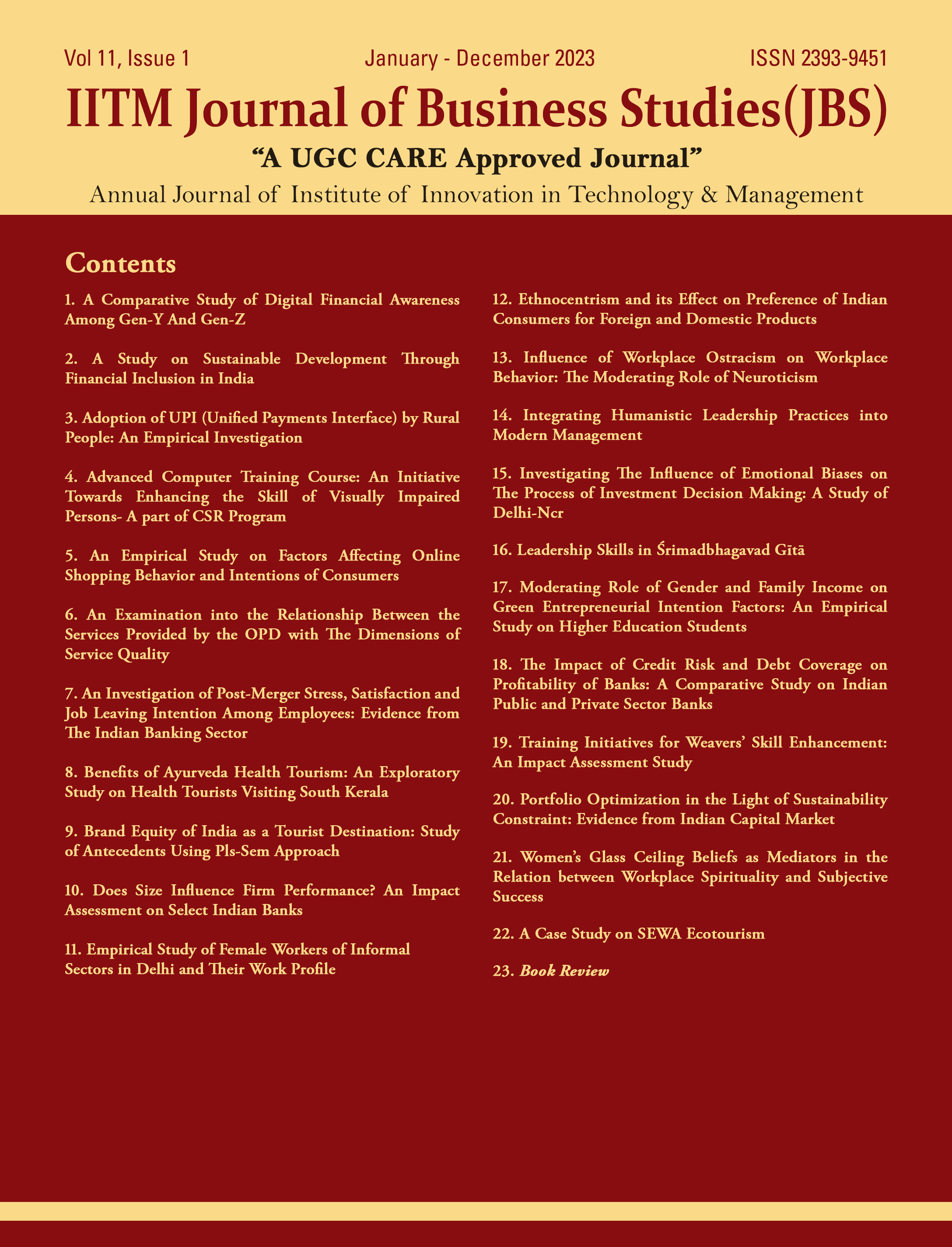CHATGPT’S POTENTIAL IN ACADEMIA AND BEYOND: AN EMPIRICAL EXAMINATION
DOI:
https://doi.org/10.48165/iitmjbs.2024.SI.1Keywords:
ChatGPT, Academia, Research Impact, AI Integration, Survey InstrumentAbstract
This paper presents a thorough investigation into the multifaceted impact of ChatGPT on academia and research, with emphasis on revolutionizing these domains through the integration of AI models. The primary objective is to develop a comprehensive survey instrument to capture various parameters and nuances associated with the influence of ChatGPT. The study engages in a thorough exploration of participants’ perspectives, examining factors such as perceived usefulness, willingness to explore innovative applications, and beliefs about the potential role of AI models in shaping academic research and publication. Ethical considerations, bias mitigation strategies, and user satisfaction are also integral components of the study.
References
Brown, T. B., Mann, B., Ryder, N., Subbiah, M., Kaplan, J., Dhariwal, P., ... & Agarwal, S. (2020). Language models are few-shot learners. Nature, 587(7835), 604-609. https://
doi.org/10.1038/s41586-020-2798-3
Wang, Y., Ritter, A., & Yih, W. (2021). Cooperative learning in the wild: Understanding the impact of large language models in pedagogical settings. arXiv preprint arXiv:2106.05784. https://arxiv.
org/abs/2106.05784
Zhang, J., Yang, Z., & Zhao, M. (2022). Personalized learning with artificial intelligence: Current trends and future directions. Educational Technology Research and Development, 70(1), 1-23. https://doi.
org/10.1007/s11423-021-10022-9
Smith, A., & Anderson, M. (2022). Automation in everyday life. Pew Research Center. https://www.pewresearch.org
Vaswani, A., Shazeer, N., Parmar, N., Uszkoreit, J., Jones, L., Gomez, A. N., ... & Polosukhin, I. (2017). Attention is all you need. In Advances in Neural Information Processing Systems (Vol. 30). https://proceedings.neurips.
cc/paper/2017/hash/3f5ee243547dee91fbd05 3c1c4a845aa-Abstract.html
Chen, M. X., Firat, O., Bapna, A., Johnson, M., Macherey, W., Foster, G., ... & Wu, Y. (2020). Multilingual translation with extensible multilingual pretraining and finetuning. arXiv preprint arXiv:2008.00401. https://arxiv.org/
abs/2008.00401
Bostrom, N., & Yudkowsky, E. (2014). The ethics of artificial intelligence. In The Cambridge Handbook of Artificial Intelligence (pp. 316-334). Cambridge University Press.
O’Neil, C. (2016). Weapons of math destruction: How big data increases inequality and threatens democracy. Crown.
OpenAI. (2023). GPT-4. Available at: https:// openai.com/research/gpt-4 (Accessed April 9, 2023).
Stokel-Walker, C., & Van Noorden, R. (2023). What ChatGPT and generative AI mean for science. Nature, 614(7947), 214-216. https:// doi.org/10.1038/d41586-023-00340-6
Keiper, M. (2023). ChatGPT in practice: Increasing event planning efficiency through artificial intelligence. Journal of Hospitality Leisure Sport & Tourism Education, 33, 100454. https://doi.org/10.1016/j.jhlste.2023.100454
Ortiz, S. (2022). What is ChatGPT, and why does it matter? Here’s what you need to know. ZDNET. Available at: https://www. zdnet.com/article/what-is-chatgpt-and-why does-it-matter-heres-what-you-need-to-know/ (Accessed January 1, 2023).
Dwivedi, Y. K., Kshetri, N., Hughes, L., Slade, E. L., Jeyaraj, A., Kar, A. K., ... & Pandey, N. (2023). “So what if ChatGPT wrote it?” Multidisciplinary perspectives on opportunities, challenges, and implications of generative conversational AI for research, practice, and policy. International Journal of Information Management, 71, 102642. https:// doi.org/10.1016/j.ijinfomgt.2023.102642
Meckler, L., & Verma, P. (2022). Teachers are on alert for inevitable cheating after the release of ChatGPT. The Washington Post. Retrieved from https://www.washingtonpost.com/education/
/12/28/chatbot-cheating-ai-chatbotgpt teachers/ (Accessed January 2, 2023).
Qasem, F. (2023). ChatGPT in scientific and academic research: Future fears and
reassurances. Library Hi Tech News. Advance online publication. https://doi.org/10.1108/ LHTN-03-2023-0043
Amodei, D., & Hernandez, D. (2022). AI and the future of research. Nature, 602(7897), 28-31. https://doi.org/10.1038/d41586-022- 00434-6
Cunha, C. T., & Rezende, M. H. (2023). The impact of ChatGPT on language learning. International Journal of Artificial Intelligence in Education.
García-Holgado, A., Li, D., & Wechsler, D. (2023). ChatGPT and accessibility in education. Universal Access in the Information
Society, 23(1), 1-13. https://doi.org/10.1007/ s10209-022-00894-3
Heffernan, N., Beck, V. A., & Koedinger, K. R. (2019). Intelligent tutoring systems with personalized feedback: An overview. In The Cambridge Handbook of Technology and Education (pp. 251-273). Cambridge University Press. https://doi.
org/10.1017/9781108333761.018
Isbell, C., Mudrick, L., & Underwood, L. (2013). Inclusive practices for students with disabilities. In The Routledge Handbook of School Psychology (pp. 277-294). Routledge. https://doi.org/10.4324/9781315761349
